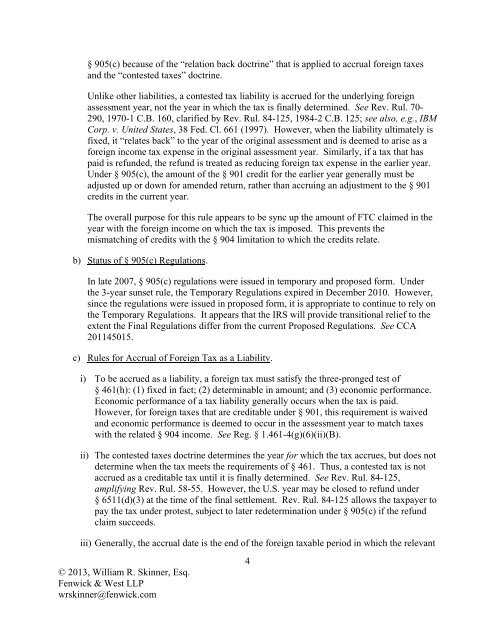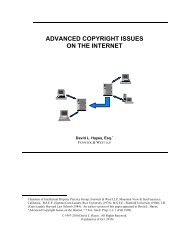Foreign Tax Redeterminations under § 905(c) - Fenwick & West LLP
Foreign Tax Redeterminations under § 905(c) - Fenwick & West LLP
Foreign Tax Redeterminations under § 905(c) - Fenwick & West LLP
Create successful ePaper yourself
Turn your PDF publications into a flip-book with our unique Google optimized e-Paper software.
§ <strong>905</strong>(c) because of the “relation back doctrine” that is applied to accrual foreign taxes<br />
and the “contested taxes” doctrine.<br />
Unlike other liabilities, a contested tax liability is accrued for the <strong>under</strong>lying foreign<br />
assessment year, not the year in which the tax is finally determined. See Rev. Rul. 70-<br />
290, 1970-1 C.B. 160, clarified by Rev. Rul. 84-125, 1984-2 C.B. 125; see also, e.g., IBM<br />
Corp. v. United States, 38 Fed. Cl. 661 (1997). However, when the liability ultimately is<br />
fixed, it “relates back” to the year of the original assessment and is deemed to arise as a<br />
foreign income tax expense in the original assessment year. Similarly, if a tax that has<br />
paid is refunded, the refund is treated as reducing foreign tax expense in the earlier year.<br />
Under § <strong>905</strong>(c), the amount of the § 901 credit for the earlier year generally must be<br />
adjusted up or down for amended return, rather than accruing an adjustment to the § 901<br />
credits in the current year.<br />
The overall purpose for this rule appears to be sync up the amount of FTC claimed in the<br />
year with the foreign income on which the tax is imposed. This prevents the<br />
mismatching of credits with the § 904 limitation to which the credits relate.<br />
b) Status of § <strong>905</strong>(c) Regulations.<br />
In late 2007, § <strong>905</strong>(c) regulations were issued in temporary and proposed form. Under<br />
the 3-year sunset rule, the Temporary Regulations expired in December 2010. However,<br />
since the regulations were issued in proposed form, it is appropriate to continue to rely on<br />
the Temporary Regulations. It appears that the IRS will provide transitional relief to the<br />
extent the Final Regulations differ from the current Proposed Regulations. See CCA<br />
201145015.<br />
c) Rules for Accrual of <strong>Foreign</strong> <strong>Tax</strong> as a Liability.<br />
i) To be accrued as a liability, a foreign tax must satisfy the three-pronged test of<br />
§ 461(h): (1) fixed in fact; (2) determinable in amount; and (3) economic performance.<br />
Economic performance of a tax liability generally occurs when the tax is paid.<br />
However, for foreign taxes that are creditable <strong>under</strong> § 901, this requirement is waived<br />
and economic performance is deemed to occur in the assessment year to match taxes<br />
with the related § 904 income. See Reg. § 1.461-4(g)(6)(ii)(B).<br />
ii) The contested taxes doctrine determines the year for which the tax accrues, but does not<br />
determine when the tax meets the requirements of § 461. Thus, a contested tax is not<br />
accrued as a creditable tax until it is finally determined. See Rev. Rul. 84-125,<br />
amplifying Rev. Rul. 58-55. However, the U.S. year may be closed to refund <strong>under</strong><br />
§ 6511(d)(3) at the time of the final settlement. Rev. Rul. 84-125 allows the taxpayer to<br />
pay the tax <strong>under</strong> protest, subject to later redetermination <strong>under</strong> § <strong>905</strong>(c) if the refund<br />
claim succeeds.<br />
iii) Generally, the accrual date is the end of the foreign taxable period in which the relevant<br />
© 2013, William R. Skinner, Esq.<br />
<strong>Fenwick</strong> & <strong>West</strong> <strong>LLP</strong><br />
wrskinner@fenwick.com<br />
4

















